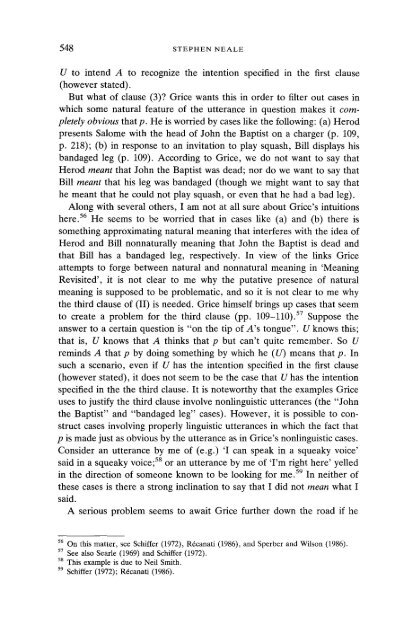Paul Grice and the philosophy of language
Paul Grice and the philosophy of language
Paul Grice and the philosophy of language
You also want an ePaper? Increase the reach of your titles
YUMPU automatically turns print PDFs into web optimized ePapers that Google loves.
548 STEPHEN NEALE<br />
U to intend A to recognize <strong>the</strong> intention specified in <strong>the</strong> first clause<br />
(however stated).<br />
But what <strong>of</strong> clause (3) <strong>Grice</strong> wants this in order to filter out cases in<br />
which some natural feature <strong>of</strong> <strong>the</strong> utterance in question makes it completely<br />
obvious that p. He is worried by cases like <strong>the</strong> following: (a) Herod<br />
presents Salome with <strong>the</strong> head <strong>of</strong> John <strong>the</strong> Baptist on a charger (p. 109,<br />
p. 218); (b) in response to an invitation to play squash, Bill displays his<br />
b<strong>and</strong>aged leg (p. 109). According to <strong>Grice</strong>, we do not want to say that<br />
Herod meant that John <strong>the</strong> Baptist was dead; nor do we want to say that<br />
Bill meant that his leg was b<strong>and</strong>aged (though we might want to say that<br />
he meant that he could not play squash, or even that he had a bad leg).<br />
Along with several o<strong>the</strong>rs, I am not at all sure about <strong>Grice</strong>'s intuitions<br />
here. 56 He seems to be worried that in cases like (a) <strong>and</strong> (b) <strong>the</strong>re is<br />
something approximating natural meaning that interferes with <strong>the</strong> idea <strong>of</strong><br />
Herod <strong>and</strong> Bill nonnaturally meaning that John <strong>the</strong> Baptist is dead <strong>and</strong><br />
that Bill has a b<strong>and</strong>aged leg, respectively. In view <strong>of</strong> <strong>the</strong> links <strong>Grice</strong><br />
attempts to forge between natural <strong>and</strong> nonnatural meaning in 'Meaning<br />
Revisited', it is not clear to me why <strong>the</strong> putative presence <strong>of</strong> natural<br />
meaning is supposed to be problematic, <strong>and</strong> so it is not clear to me why<br />
<strong>the</strong> third clause <strong>of</strong> (II) is needed. <strong>Grice</strong> himself brings up cases that seem<br />
to create a problem for <strong>the</strong> third clause (pp. 109-110). 57 Suppose <strong>the</strong><br />
answer to a certain question is "on <strong>the</strong> tip <strong>of</strong> A's tongue". U knows this;<br />
that is, U knows that A thinks that p but can't quite remember. So U<br />
reminds A that p by doing something by which he (U) means that p. In<br />
such a scenario, even if U has <strong>the</strong> intention specified in <strong>the</strong> first clause<br />
(however stated), it does not seem to be <strong>the</strong> case that U has <strong>the</strong> intention<br />
specified in <strong>the</strong> <strong>the</strong> third clause. It is noteworthy that <strong>the</strong> examples <strong>Grice</strong><br />
uses to justify <strong>the</strong> third clause involve nonlinguistic utterances (<strong>the</strong> "John<br />
<strong>the</strong> Baptist" <strong>and</strong> "b<strong>and</strong>aged leg" cases). However, it is possible to construct<br />
cases involving properly linguistic utterances in which <strong>the</strong> fact that<br />
p is made just as obvious by <strong>the</strong> utterance as in <strong>Grice</strong>'s nonlinguistic cases.<br />
Consider an utterance by me <strong>of</strong> (e.g.) 'I can speak in a squeaky voice'<br />
said in a squeaky voice; 58 or an utterance by me <strong>of</strong> 'I'm right here' yelled<br />
in <strong>the</strong> direction <strong>of</strong> someone known to be looking for me. 59 In nei<strong>the</strong>r <strong>of</strong><br />
<strong>the</strong>se cases is <strong>the</strong>re a strong inclination to say that I did not mean what I<br />
said.<br />
A serious problem seems to await <strong>Grice</strong> fur<strong>the</strong>r down <strong>the</strong> road if he<br />
56 On this matter, see Schiffer (1972), R6canati (1986), <strong>and</strong> Sperber <strong>and</strong> Wilson (1986).<br />
57 See also Searle (1969) <strong>and</strong> Schiffer (1972).<br />
58 This example is due to Neil Smith.<br />
59 Schiller (1972); R6canati (1986).














